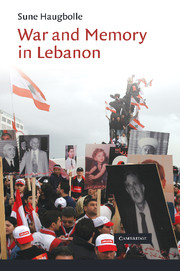Book contents
- Frontmatter
- Contents
- Figures
- Acknowledgments
- Note on Transliteration
- Acronyms
- War and Memory in Lebanon
- Prologue: A Hiatus of History
- 1 Remembering a War of Selves and Others
- 2 Culture, Politics, Civil War
- 3 Discourses on Amnesia and Reconstruction: Memory in the 1990s
- 4 Nostalgias
- 5 Inside Violence
- 6 Sectarian Memory Cultures
- 7 Truth Telling in the Independence Intifada
- Conclusion
- Bibliography
- Index
- Titles in the series
1 - Remembering a War of Selves and Others
Published online by Cambridge University Press: 05 May 2010
- Frontmatter
- Contents
- Figures
- Acknowledgments
- Note on Transliteration
- Acronyms
- War and Memory in Lebanon
- Prologue: A Hiatus of History
- 1 Remembering a War of Selves and Others
- 2 Culture, Politics, Civil War
- 3 Discourses on Amnesia and Reconstruction: Memory in the 1990s
- 4 Nostalgias
- 5 Inside Violence
- 6 Sectarian Memory Cultures
- 7 Truth Telling in the Independence Intifada
- Conclusion
- Bibliography
- Index
- Titles in the series
Summary
History is the lie commonly agreed upon.
– VoltaireThere are lies of which the ear is more guilty than the mouth.
– Amin Maalouf, Leo the AfricanRemembering, Representation, Postnationalism
A people must know its past in order not to repeat it, so a popular truism has it. To the individual members of a political community, however, the past more often than not is a foreign country where human beings navigate according to the whims of memory rather than to the laudable ideals of objective history. Moreover, despite the focus on nationalism in many studies of social memory, personal memories in the public realm are not exclusively couched in narratives of nations and peoples. And even when they are, they often sit uneasily with official representation. This dilemma between the need for collective frameworks for understanding history and the often-fragmented nature of social memory has a particular bearing on culture and politics in societies emerging from colonialism, repression or war. In Middle Eastern countries like Palestine and Israel, Turkey, Iran, Iraq, Sudan, Algeria and Lebanon, political violence resulting in contested, multifaceted and politically salient memories has shaped and framed the modern experience of state – and nationhood. The war known as the Lebanese Civil War is a case in point. Interpretations of the series of conflicts that ravaged Lebanon between 1975 and 1990 vary dramatically in popular, official and academic renderings.
- Type
- Chapter
- Information
- War and Memory in Lebanon , pp. 5 - 28Publisher: Cambridge University PressPrint publication year: 2010

